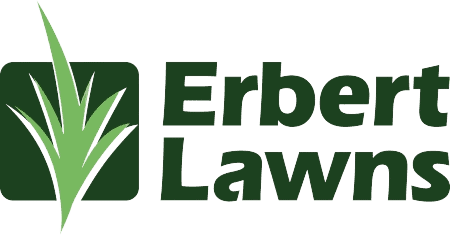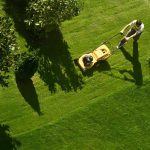
In Denver, maintaining a lush, vibrant lawn while protecting the environment is possible through eco-friendly lawn care practices. At Erbert Lawns, we believe in nurturing not just your lawn, but also the planet. In this article, we’ll explore sustainable methods that help keep your lawn healthy, while reducing your carbon footprint.
Key Takeaways
- Water wisely to conserve resources and support healthier grass.
- Use organic fertilizers and avoid harmful chemicals.
- Incorporate native plants for a low-maintenance, eco-friendly landscape.
- Mulch often to improve soil quality and help hold onto moisture.
- Adopt sustainable mowing practices to reduce pollution and enhance lawn health.
What Makes Lawn Care Eco-Friendly?
Eco-friendly lawn care emphasizes techniques that conserve water, minimize chemical use, and foster a healthy ecosystem. These techniques improve the environment’s health in addition to producing lovely outdoor areas. Let’s delve into some top practices for a greener, more sustainable lawn.
-
Water Conservation: Less is More
In the semi-arid climate of Denver, water conservation is crucial to maintaining a sustainable and eco-friendly lawn. Overwatering not only wastes precious water but also increases the risk of soil erosion and runoff. Implementing smart irrigation strategies can help you achieve a lush lawn while using significantly less water.
- Install a Drip Irrigation System: A drip irrigation system delivers water directly to the roots, minimizing evaporation and ensuring the water reaches where it’s most needed. When compared to conventional sprinklers, this approach is far more efficient.
- Water Your Grass Early in the Morning or Late in the Evening: Watering your grass early in the morning or late at night minimizes evaporative water loss. This fosters healthier roots by making it possible for water to permeate the soil more effectively.
- Use Rain Barrels to Harvest Rainwater: Installing rain barrels to collect and store rainwater is an excellent way to irrigate your lawn naturally. This practice not only conserves water but also reduces your reliance on municipal water systems.
-
Ditch Harmful Chemicals
Using synthetic fertilizers and pesticides can have serious environmental consequences, from contaminating groundwater to harming beneficial insects and pollinators. Transitioning to eco-friendly alternatives not only protects the environment but also fosters a healthier, more resilient lawn. Here are some practices to consider:
- Opt for Organic Fertilizers: Unlike synthetic fertilizers, organic options are made from natural materials such as compost, manure, and bone meal. These fertilizers release nutrients slowly over time, ensuring a steady supply of nourishment for your lawn without the risk of chemical runoff. Additionally, organic fertilizers improve the soil structure, allowing it to retain moisture and support healthy root growth.
- Start Composting for Natural Fertilization: Composting organic waste, such as grass clippings, leaves, and kitchen scraps, creates a nutrient-rich fertilizer that is completely natural. This process not only reduces waste but also enriches the soil with essential nutrients, improving its ability to retain moisture and support plant life. Compost acts as a natural soil conditioner, promoting healthier and more sustainable lawn growth.
- Implement Natural Pest Control: Instead of using chemical pesticides, which can harm the environment and kill off beneficial insects, encourage the presence of natural predators. For example, ladybugs, lacewings, and other beneficial insects can help control harmful pests like aphids and mites. You can also use organic pest control methods such as neem oil or diatomaceous earth to protect your lawn without causing harm to the ecosystem.
-
Use Native Plants for a Resilient Lawn
Denver’s unique climate, characterized by periods of drought and temperature fluctuations, can make it difficult for non-native plants to thrive. These plants often require excessive water, fertilizers, and maintenance. You may lessen your environmental impact and build a more resilient and sustainable lawn by using native grasses and plants.
- Reduce Water Usage with Drought-Tolerant Species: Native plants have adapted to Denver’s climate over centuries, making them naturally more drought-tolerant than non-native species. This means they require significantly less water, helping you conserve water while maintaining a healthy and vibrant lawn. In fact, native plants often thrive on rainfall alone, drastically reducing the need for supplemental irrigation.
- Promote Biodiversity by Supporting Local Wildlife: Native plants play a crucial role in maintaining local ecosystems. They provide food and habitat for pollinators like bees, butterflies, and birds, which in turn help support biodiversity. By incorporating native species into your lawn, you’re contributing to a balanced ecosystem that fosters a thriving community of plants and animals.
- Lower Maintenance Needs for a Stress-Free Lawn: Native plants are naturally suited to Denver’s soil and climate, meaning they require fewer inputs like fertilizers, pesticides, and water. Their deep root systems help them resist pests and diseases, while also improving soil structure.
-
Mulch for Soil Health
Mulching is an easy and efficient way to meet your garden’s mulch needs while boosting lawn health and lowering environmental impact. By using mulch, you can retain moisture, control weed growth, and prevent soil erosion, all without resorting to chemical fertilizers or herbicides.
- Organic Mulch Enriches the Soil Naturally: Organic materials like wood chips, leaves, or grass clippings make excellent mulch. As these materials break down over time, they release essential nutrients into the soil, improving its fertility and structure.
- Grasscycling: A Simple Way to Fertilize and Mulch. The practice, known as grasscycling, acts as a natural fertilizer by returning valuable nutrients like nitrogen back into the soil. It also helps the soil retain moisture and reduces the need for chemical fertilizers, making it a win-win for both your lawn and the environment.
-
Eco-Friendly Mowing Practices
Though mowing is a routine task for most lawn owners, the way you mow can significantly impact the health of your lawn and its effect on the environment. By adopting eco-friendly mowing practices, you can reduce emissions, promote healthier grass growth, and decrease the overall environmental footprint of your lawn care routine.
- Mow Higher to Encourage Deeper Roots and Better Resilience: Setting your mower blades higher allows the grass to grow longer, which encourages deeper root development. Deeper roots make your lawn more drought-resistant and resilient to stress, as they can access water and nutrients more efficiently. This reduces the need for frequent watering and fertilization, ultimately promoting a healthier, more sustainable lawn.
- Switch to Electric Mowers for a Cleaner, Greener Lawn: Gas-powered mowers contribute to air pollution and carbon emissions. By switching to an electric mower or a manual push mower, you can reduce your carbon footprint and create a cleaner, healthier environment. Electric mowers are quieter, require less maintenance, and do not emit harmful pollutants, making them a more eco-friendly option for lawn care.
- Sharpen Mower Blades Regularly for Cleaner Cuts: Dull mower blades tear the grass rather than cut it cleanly, which can stress the plants and lead to increased water and nutrient demands. Keeping your mower blades sharp ensures cleaner cuts, reducing damage to the grass and promoting healthier growth. Regular blade maintenance also increases mowing efficiency, helping you complete the task with less energy and effort.
Conclusion
Eco-friendly lawn care practices not only promote a healthy lawn but also enhance its beauty while helping to protect Denver’s environment. At Erbert Lawns, we are committed to offering sustainable solutions tailored to your needs. Contact us today to learn more about our eco-friendly lawn care services and start making your lawn greener both in color and impact.
FAQs
- How can I conserve water while maintaining a green lawn?
Using drip irrigation systems, watering during cooler hours, and incorporating drought-resistant plants can help you save water while keeping your lawn lush.
- How can I control pests naturally on my lawn?
Introducing beneficial insects like ladybugs and using organic pest control methods can help manage pests without harming the environment.
- What are the best native plants for Denver lawns?
Native plants like buffalo grass and blue grama are drought-resistant and well-suited to Denver’s climate, reducing water use and maintenance.
- How often should I mulch my lawn?
Mulching can be done after every mowing session. Grass clippings act as a natural fertilizer, promoting healthier soil and moisture retention.
- How can I make mowing more eco-friendly?
Switch to electric mowers, mow higher to promote root growth, and keep your blades sharp to minimize lawn damage.











